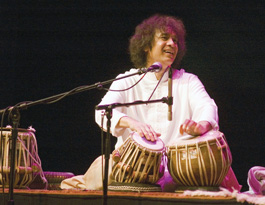home | metro santa cruz index | music & nightlife | band review

Photograph by Susana Millman
Drumming Up Interest: Tabla-tapping icon Zakir Hussain plays Friday at the Rio.
Tabla Dance
Santoor master Shivkumar Sharma and tabla titan Zakir Hussain continue a 40-year tradition of joining forces onstage.
By Andrew Gilbert
When Shivkumar Sharma and Zakir Hussain share the stage, it's far more than an encounter between two of the most celebrated musicians in Indian music. They embody both the generational ties that have sustained classical Indian music for centuries and the tradition's openness to innovation.
By the time they first performed together in the mid-1960s, Hussain was a teenage tabla phenomenon who had already staked a claim as the rightful heir to the genius of his father, Ustad Alla Rakha, and Sharma had singlehandedly transformed the Kashmiri hammered dulcimer, or santoor, into a viable classical instrument. They've joined forces regularly ever since, carrying on a masterly musical dialogue around the world.
"I believe Zakir played his concert with me when he was 15 years old," says Sharma, 71, who performs with Hussain for Arts & Lectures at the Rio Theatre on Friday. "When I came to the United States in 1968 his father played with me on the tour. In India, it's very interesting the way one generation connects to the next. I have played with Zakir's father, and Zakir has played with me and my son," he says, referring to the rising composer and santoor star Rahul Sharma.
Hussain first came to the United States in 1970 as accompanist for Ravi Shankar and settled in Marin to teach at the Ali Akbar College of Music. Within a year he had become a major force on the multifarious Bay Area music scene, collaborating with a dazzling array of artists, including alto saxophonist John Handy and Grateful Dead drummer Mickey Hart.
He went on to co-found the pioneering Indo-jazz ensemble Shakti with guitarist John McLaughlin and to accompany pop icons George Harrison and Van Morrison. At the same time, Hussain has excelled as a composer, writing scores for Hollywood and Bollywood productions and numerous dance troupes. In many ways, he arrived in the Bay Area primed to step outside of classical contexts.
"My father used to bring me records of Jefferson Starship, the Grateful Dead, Duke Ellington and Thelonious Monk, and I was listening to all of that," Hussain says. "So when I arrived here I was open and excited about being bent out of shape a little bit. It was a case of right place/right time and having enough know-how to make the most of it. But it's very important for me to keep in touch with the classical tradition."
Few musicians have done more to extend the Indian classical tradition than Sharma. In another story of fathers and sons, he undertook the unprecedented task of adapting the santoor, a Kashmiri folk instrument, at the urging of his father, a respected Sufi vocalist from an aristocratic family. Through patient trial and error, he ended up expanding the santoor's range and smoothing the glissando so he could sustain and slide between notes in emulation of the human voice.
"People were very skeptical, but my father was very clear: I have to play this instrument," Sharma says. "And if I have to do this, I have to create a distinct technique and tonal quality for the santoor. I had to modify many things. I changed the tuning system. I rearranged the strings. I increased the number of bridges. It took about 10 to 12 years, and by the middle of 1960s people changed their opinions."
The major breakthrough was the classic 1968 album Call of the Valley, a landmark recording that introduced Indian classical music to an international audience. Featuring Sharma, guitarist Brijbushan Kabra and flutist Hariprasad Chaurasia, the beatific session captures an entire world in entrancing detail.
"When we recorded this in 1967, I never realized it would become a milestone," Sharma says. "We were starting our careers, trying to make our place known. I never imagined it would be so successful."
Shivkumar Sharma and Zakir Hussain perform Friday, April 10, at 7:30pm at the Rio Theatre, 1205 Soquel Ave., Santa Cruz. Tickets are $35-$40, available at 831.459.2159 or www.riotheatre.com.
Send a letter to the editor about this story.
|
|
|
|
|
|